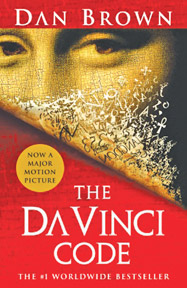Millions worth gibberish
 The Da Vinci Code, like all good thrillers, begins with a murder. The
curator of the Louvre is found dead in the museum, his body disfigured
and a cryptic message scrawled on the floor near him: O, Draconian
devil! Oh, lame saint! The Da Vinci Code, like all good thrillers, begins with a murder. The
curator of the Louvre is found dead in the museum, his body disfigured
and a cryptic message scrawled on the floor near him: O, Draconian
devil! Oh, lame saint!
Cryptology or cryptography is the study and process of encoding and
decoding plain text messages so that they cannot be read by anyone
without a guide or key. Historians date the use of cryptology back to
Ancient Egyptian times and suggests that secret codes developed quite
soon after written language was developed. As well, conversation might
be encoded, as is frequent radio transmissions or cell phone
conversations.
Cryptology seems to many a rather romantic field, and the deciphering
of secret messages is the subject of many thriller novels. Most
recently, The Da Vinci Code involved a mystery of a series of clues and
codes that pointed to a Catholic Church conspiracy to keep people from
finding out that Mary Magdalene was one of the early disciples of Jesus
Christ. The idea of secret codes and hidden messages enchants many,
accounting for the great popularity of Dan Brown’s novel.
Today, cryptology is often very technical in encoding or decoding
processes, due to the use of computers. Computers can frequently evolve
codes that are virtually unbreakable.

A certain amount of cryptology is necessary too, to protect the
security of computers. Codes and passwords help protect software and
hardware from “hacking” which can reveal information about private
plans, social security numbers or credit card numbers.
In fact the majority of illegal decryption of secure information in
computers is to steal identities.
Another primary reason for encrypting information is to protect
secret operations of a country, particularly in times of war. There is a
famous anagram called ‘Datha madagan raale’ which simply meant Raala,
brush your tooth but carried out the meaning ‘bring the sacred tooth
relic to Kandy.
While some codes are simplistic, usually computer produced codes are
based on algorithmic patterns that prevent illegal decryptors from
finding out information about military plans or weaponry.
Since virtually all codes can be broken, given enough time and
effort, those in the field of cryptology must constantly work to develop
new codes to keep customers or information secure.
Decisions about the best codes to use are made by cryptographic
engineers, who rely heavily on cryptology to determine the history of
how easily certain types of encryptions are deciphered.
Research about military codes done by a cryptologist may never be
published. In fact there is great concern within certain countries about
allowing access to previously secret codes since this may allow access
to information that is still considered secret. As well, analysis of
codes used before can help illegal decryptors guess what codes might be
used in the future. Thus encryption methods are often guarded as
carefully as any material that is encrypted and sale of such information
to foreign interests can carry heavy criminal penalties.
Some methods, like the use of algorithms are a predictable type of
cryptology, and occasionally, to protect certain secrets, the military
or other secure organization may resort to earlier written or spoken
codes, or variations on such. Someone with a working knowledge of the
history of cryptology may be able to break such codes, but often if the
codes are in use for only a short period of time, there is not enough
time for information to escape before another method is employed.
Creating as well as breaking codes is a marvel of language. It is one
of the unique features of human language. |



